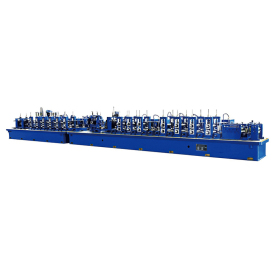[Pipe making machine for steel]Understanding the Importance of Pipe Making Machines for Steel: A Comprehensive Guide for Manufacturers and Industries
News 2024-12-12

Understanding the Importance of Pipe Making Machines for Steel: A Comprehensive Guide for Manufacturers and Industries
In the modern industrial landscape, the demand for high-quality steel pipes continues to grow exponentially. These pipes are vital components in various sectors, including construction, oil and gas, automotive, and manufacturing. To meet this demand, manufacturers are increasingly relying on advanced technology, such as pipe making machines for steel, which streamline production processes and enhance product quality. In this article, we will explore the significance of pipe making machines, their operation, and their impact on the steel industry.
The Role of Pipe Making Machines in Steel Production
Pipe making machines, also known as pipe manufacturing machines or pipe mills, are specialized equipment designed to produce seamless and welded steel pipes. These machines are instrumental in transforming raw materials, such as steel sheets and coils, into finished pipe products used in various applications.
The primary functions of pipe making machines include:

Understanding the Importance of Pipe Making Machines for Steel: A Comprehensive Guide for Manufacturers and Industries
2. **Welding**: In the case of welded pipes, the edges of the formed steel are brought together and welded using techniques like high-frequency induction welding or electric resistance welding. This step is crucial for ensuring the structural integrity of the pipe.
3. **Sizing**: After welding, the pipe is sized to meet specific standards and dimensions, ensuring that it conforms to industry requirements. This process often includes cutting and shaping to achieve the desired length and diameter.
4. **Finishing**: Finally, the pipe undergoes various finishing processes, such as polishing, coating, or heat treatment, to enhance its corrosion resistance and overall durability.
Advancements in Pipe Making Technology
With the rise of Industry 4.0, pipe making machines have undergone significant advancements. The integration of automation, artificial intelligence, and smart technologies has transformed traditional manufacturing practices. Key developments include:
- **Automation**: Modern pipe making machines are equipped with automated systems that enhance efficiency and reduce human error. Automation allows for precise control over the production process, leading to higher output and improved product quality.
- **Quality Control**: Advanced monitoring systems enable real-time quality control, allowing manufacturers to detect defects early in the production process. Automated inspection technologies ensure that only pipes meeting stringent quality standards are delivered to customers.
- **Flexible Production**: Many modern machines offer flexibility in terms of pipe sizes and materials. This adaptability allows manufacturers to respond quickly to changing market demands and produce a wide range of pipe products without significant downtime.
- **Energy Efficiency**: Newer pipe making machines are designed to be more energy-efficient, minimizing energy consumption during the manufacturing process. This sustainability focus aligns with global efforts to reduce carbon emissions and promote greener manufacturing practices.

Understanding the Importance of Pipe Making Machines for Steel: A Comprehensive Guide for Manufacturers and Industries
The introduction of state-of-the-art pipe making machines has significant economic implications for manufacturers and industries relying on steel pipes. The benefits include:
- **Cost Reduction**: Automation and improved production processes lead to lower labor costs and increased operational efficiency. Manufacturers can produce more pipes in less time, reducing per-unit costs.
- **Increased Competitiveness**: By investing in advanced technology, manufacturers can offer high-quality products at competitive prices, enhancing their market position. The ability to quickly adapt to customer specifications also provides a competitive edge.
- **Job Creation**: While automation may reduce certain manual jobs, the adoption of new technology typically creates demand for skilled workers who can operate and maintain advanced machinery. The need for engineers, technicians, and machine operators continues to grow.
Conclusion
Pipe making machines for steel play a pivotal role in modern manufacturing, meeting the growing global demand for high-quality steel pipes. As technology continues to evolve, these machines are becoming increasingly sophisticated, driving efficiency, quality, and sustainability in the production process. For manufacturers, investing in advanced pipe making technology is not just an operational decision but a strategic move to secure a competitive advantage in a rapidly evolving market. Embracing these innovations will enable industries to thrive and support the infrastructure needs of our increasingly interconnected world.
